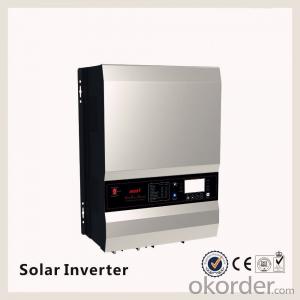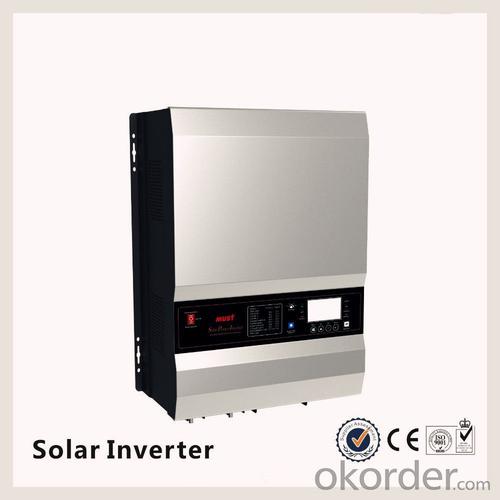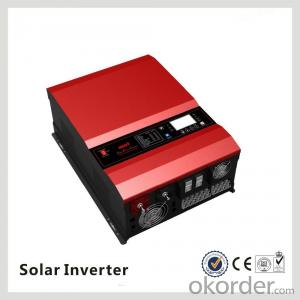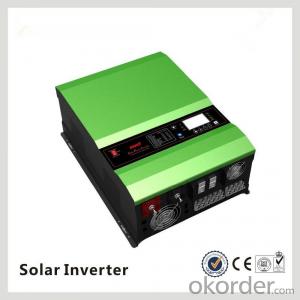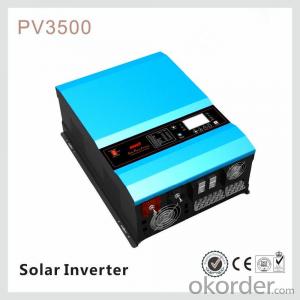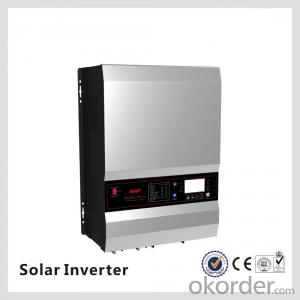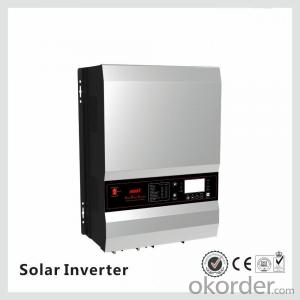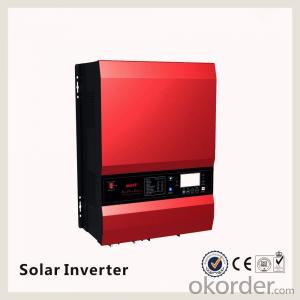Pv3500 Solar Inverter PV35-9K Low Frequency DC to AC Solar Power Inverter 12KW
- Loading Port:
- Shanghai
- Payment Terms:
- TT OR LC
- Min Order Qty:
- 1000 watt
- Supply Capability:
- 100000 watt/month
OKorder Service Pledge
OKorder Financial Service
You Might Also Like
Product Description
What is Solar inverter?
Solar pv inverters is an electronic system that operates the photovoltaic(PV) modules in a manner that allows the modules to produce all the power they are capable of. The solar mate charge controller is a microprocessor-based system designed to implement the MPPT. It can increase charge current up to 30% or more compared to traditional charge controllers.
Features
· Power range 1KW - 12KW
· Inbuilt pure copper transformer
· Powerful charge rate up to 100Amp
· MPPT solar charge controller 45A 60A (120A Option)
· PV input:145V max
· 12V/24V/36V/48V auto work
· MPPT efficiency>99% , Peak conversion efficiency>98%
· DSP processors architecture ensure high speed and performance
· Four-stages charging mode
· Protection: PV array short circuit, PV reverse polarity, Battery reverse polarity, Over charging, Output short circuit
· High efficency design & "Power Saving Mode" to coverse energy
Specification
MODEL | PV35-1K | PV35-2K | PV35-3K | PV35-4K | |||||||||||||||
Default Battery System Voltage | 12VDC | 24VDC | 12VDC | 24VDC | 12VDC | 24VDC | 12VDC | 24VDC | |||||||||||
INVERTER OUTPUT | Rated Power | 1KW | 2KW | 3000VA/2.4KW | 4000VA/3.2KW | ||||||||||||||
Surge Rating (20ms) | 3KW | 6KW | 9KW | 12KW | |||||||||||||||
Capable Of Starting Electric Motor | 1HP | 1HP | 1.5HP | 2HP | |||||||||||||||
Waveform | Pure sine wave/ same as input (bypass mode) | ||||||||||||||||||
Nominal Output Voltage RMS | 100V/110V/120VAC 220V/230V/240VAC(+/-10% RMS) | ||||||||||||||||||
Output Frequency | 50Hz/60Hz +/-0.3 Hz | ||||||||||||||||||
Inverter Efficiency(Peak) | >88% | ||||||||||||||||||
Line Mode Efficiency | >95% | ||||||||||||||||||
Power Factor | 0.8 | ||||||||||||||||||
Typical Transfer Time | 10ms(max) | ||||||||||||||||||
AC INPUT | Voltage | 230VAC | |||||||||||||||||
Selectable Voltage Range | 96~132VAC/155~280VAC(For Personal Computers) | ||||||||||||||||||
Frequency Range | 50Hz/60Hz (Auto sensing) 40-80Hz | ||||||||||||||||||
BATTERY | Minimum Start Voltage | 10.0VDC /10.5VDC for12VDC mode (*2 for 24VDC, *4 for 48VDC) | |||||||||||||||||
Low Battery Alarm | 10.5VDC+/-0.3V for12VDC mode (*2 for 24VDC, *4 for 48VDC) | ||||||||||||||||||
Low Battery Cutoff | 10.0VDC+/-0.3V for12VDC mode (*2 for 24VDC, *4 for 48VDC) | ||||||||||||||||||
High Voltage Alarm | 16.0VDC+/-0.3V for12VDC mode (*2 for 24VDC, *4 for 48VDC) | ||||||||||||||||||
High Battery Voltage Recover | 15.5VDC+/-0.3V for12VDC mode (*2 for 24VDC, *4 for 48VDC) | ||||||||||||||||||
Idle Consumption-Search Mode | <25W when power saver on | ||||||||||||||||||
CHARGER | Output Voltage | Depends on battery type | |||||||||||||||||
Charger AC Input Breaker Rating | 10A | 30A | 30A | 30A | |||||||||||||||
Overcharge Protection S.D. | 15.7VDC for 12VDC mode (*2 for 24VDC, *4 for 48VDC) | ||||||||||||||||||
Maximum Charge Current | 45A | 25A | 70A 35A | 90A 50A | 65A 40A | ||||||||||||||
BTS | Continuous Output Power | Yes Variances in charging voltage & S.D. voltage base on the battery temperature | |||||||||||||||||
BYPASS & PROTECTION | Input Voltage Waveform | Sine wave (grid or generator) | |||||||||||||||||
Nominal Input Frequency | 50Hz or 60Hz | ||||||||||||||||||
Overload Protection (SMPS Load) | Circuit breaker | ||||||||||||||||||
Output Short Circuit Protection | Circuit breaker | ||||||||||||||||||
Bypass Breaker Rating | 10A | 15A | 20A | 40A | |||||||||||||||
Max Bypass Current | 30Amp | ||||||||||||||||||
SOLAR CHARGER | Maximum PV Charge Current | 45A | |||||||||||||||||
DC Voltage | 12V/24V atuo work | ||||||||||||||||||
Maximum PV Array Power | 600W | 1200W | 600W | 1200W | 600W | 1200W | 600W | 3200W | |||||||||||
MPPT Range @ Operating Voltage(VDC) | 16-100VDC for 12V mode,32-100V for 24V mode | ||||||||||||||||||
Maximum PV Array Open Circuit Voltage | 100VDC | 147VDC | |||||||||||||||||
Maximum Efficiency | >98% | ||||||||||||||||||
Standby Power Consumption | <2w< span=""> | ||||||||||||||||||
MECHANICAL SPECIFICATIONS | Mounting | Wall mount | |||||||||||||||||
Dimensions (W*H*D) | 493*311*215mm | ||||||||||||||||||
Net Weight (Solar CHG) kg | 23.5 | 24.5 | 25.5 | 29.5 | |||||||||||||||
Shipping Dimensions(W*H*D) | 580*400*325mm | ||||||||||||||||||
Shipping Weight (Solar CHG) kg | 25.5 | 26.5 | 27.5 | 31.5 | |||||||||||||||
OTHER | Operation Temperature Range | 0°C to 40°C | |||||||||||||||||
Storage Temperature | -15°C to 60°C | ||||||||||||||||||
Audible Noise | 60dB MAX | ||||||||||||||||||
Display | LED+LCD | ||||||||||||||||||
Loading(20GP/40GP/40HQ) | 150pcs/300pcs/350pcs | ||||||||||||||||||
Images
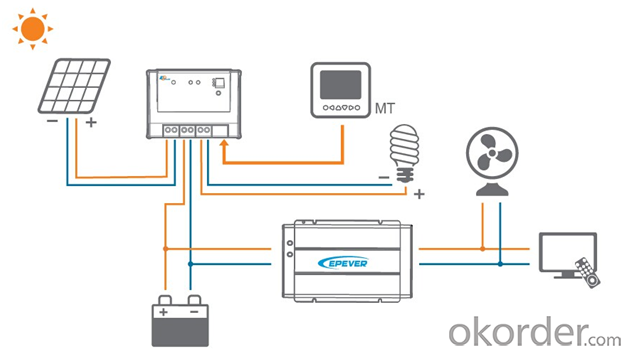
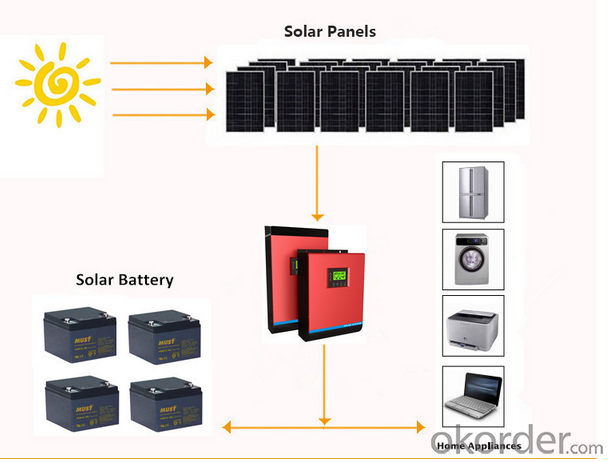
Packaging & Shipping
What is the packing?
1.Package: Carton Box for packaging, or Wooden Box advised for Samples to protect in transportations. Package designed by Clients is welcomed.
2.Shipping: DHL,FEDEX,UPS,EMS,AirWay and By Sea.
3.Payment: T/T( telegraphic transfer (T/T) and Western Union
4.Welcome to your Sample Order to test First.
FAQ
Q1: How to choose a right inverter?
A1:Tell us your demand, then our sales will recommend a suitable inverter to you.
Q2: What's the different between inverter and solar inverter?
A2: Inverter is only accept AC input, but solar inverter not only accept AC input but also can connect with solar panel to accept PV input, it more save power.
Q3: How about the delivery time?
A3: 7 days for sample; 25 days for bulk order.
- Q: How does a solar inverter handle voltage fluctuations from the grid?
- A solar inverter handles voltage fluctuations from the grid by constantly monitoring the voltage and adjusting its output accordingly. When the grid voltage increases or decreases, the inverter's control system regulates its own output voltage to match the changes, ensuring a stable and consistent supply of electricity is fed into the grid. This helps to maintain grid stability and protect the connected devices from potential damage caused by voltage fluctuations.
- Q: What is the role of an isolation transformer in a solar inverter?
- The role of an isolation transformer in a solar inverter is to provide electrical isolation and safety. It separates the input and output circuits, preventing any direct connection between them. This isolation helps protect the solar inverter and connected devices from electrical faults, surges, and other potential hazards. Additionally, it can minimize the risk of electrical shocks and reduce electromagnetic interference.
- Q: Can a solar inverter be used with different types of tracking systems?
- Yes, a solar inverter can be used with different types of tracking systems. The function of a solar inverter is to convert the DC (direct current) generated by the solar panels into AC (alternating current) that can be used to power electrical devices. As long as the tracking system is capable of generating DC power from the solar panels, the solar inverter can be used to convert it into usable AC power.
- Q: Can a solar inverter be easily integrated into an existing electrical system?
- Yes, a solar inverter can be easily integrated into an existing electrical system. It is designed to convert the direct current (DC) power generated by solar panels into alternating current (AC) power that can be used by the electrical system. The inverter can typically be connected to the existing electrical system through a simple installation process, allowing the solar energy to be seamlessly integrated and utilized alongside the conventional power supply.
- Q: What are the potential risks of short-circuiting a solar inverter?
- Short-circuiting a solar inverter can pose several potential risks. Firstly, it can cause damage to the inverter itself, leading to a significant financial loss as these devices are expensive to repair or replace. Secondly, a short-circuit can result in overheating, which may lead to a fire hazard in the electrical system, putting the safety of the property and individuals at risk. Additionally, a short-circuit can disrupt the flow of electricity from the solar panels, potentially causing a loss of power generation and financial implications for the system owner. Therefore, it is crucial to take necessary precautions and ensure proper installation and maintenance to prevent short-circuiting of solar inverters.
- Q: What is the role of a solar inverter in a solar-powered electric vehicle charging station?
- The role of a solar inverter in a solar-powered electric vehicle charging station is to convert the direct current (DC) produced by the solar panels into alternating current (AC) that can be used to charge electric vehicles. The inverter ensures that the electricity generated by the solar panels is compatible with the charging station and the electric vehicle's charging requirements.
- Q: Are there any ongoing maintenance requirements for a solar inverter?
- Yes, there are ongoing maintenance requirements for a solar inverter. Regular inspections, cleaning, and monitoring of the inverter's performance are necessary to ensure its optimal functioning. Additionally, checking for any loose connections, updating firmware, and addressing any potential issues promptly are part of the maintenance routine.
- Q: Can a solar inverter be used off-grid?
- Yes, a solar inverter can be used off-grid. In fact, off-grid solar systems often require a solar inverter to convert the DC power generated by solar panels into AC power that can be used to power appliances and devices.
- Q: What are the common issues and troubleshooting steps for a solar inverter?
- Some common issues with solar inverters include no power output, low power output, display or communication errors, and overheating. Troubleshooting steps for these issues may involve checking the input voltage and connections, inspecting the DC and AC cables for damage, resetting the inverter, updating firmware or software, ensuring proper ventilation and cooling, and contacting technical support if necessary.
- Q: What is the role of a solar inverter in preventing electrical hazards?
- The role of a solar inverter in preventing electrical hazards is to convert the direct current (DC) generated by solar panels into alternating current (AC) that is suitable for use in homes and businesses. By ensuring the safe and efficient conversion of power, solar inverters help to minimize the risk of electrical hazards such as electrical shock, fire, or damage to electrical appliances and equipment. They also incorporate safety features like ground-fault protection and overvoltage protection, further enhancing their role in preventing electrical hazards.
Send your message to us
Pv3500 Solar Inverter PV35-9K Low Frequency DC to AC Solar Power Inverter 12KW
- Loading Port:
- Shanghai
- Payment Terms:
- TT OR LC
- Min Order Qty:
- 1000 watt
- Supply Capability:
- 100000 watt/month
OKorder Service Pledge
OKorder Financial Service
Similar products
Hot products
Hot Searches
Related keywords
